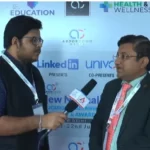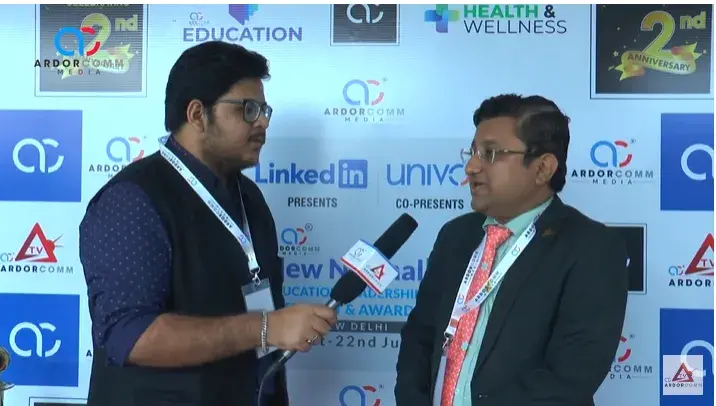ArdorComm Media Bureau
August 18, 2023
“I think the first prerogative for the schools is to comply with the national policies which have come out after a long time,” says Arijit Ghosh, AVP- Academics, Seth M.R. Jaipuria Schools, in an Interview with Pratik Ghosh, Content Writer, ArdorComm Media Group at the ‘New Normal – Education Leadership Summit & Awards 2023’ #ELSANewDelhi #ELSAGurugram
How are you feeling to witness the New Normal Education Leadership Summit and Award in Delhi?
Oh, it’s fantastic. First of all, thank you for having me here today. I think the topics which have been discussed today are very, very relevant in the present times. So, about sustainable development goals and especially its impact from early childhood, from the foundational years. We all know that the NCF is out for foundational stages of school education, so it’s very, very important. Also, the topics like the STEM education, the relevance of STEM education, the skills. So, these are very, very valid discussion points and we see the buzz happening in the room and a lot of learning being shared.
The theme of our event is India Vision 2030. According to you, what should be the vision for the school education sector going ahead?
So, first and foremost is the kind of compliance with the NEP and what the vision is with the NEP and the NCF documents which are now coming out. So, I think the first prerogative for the schools is to comply with the national policies which have come out after a long time. That’s one. Number two, I think it’s a very aspirational document, the National Education Policy, with all the global perspectives also into taking into account. So, I think if we focus more on bringing impact, and I would say having data into our schools is very, very important. The impact measurement. It’s not about just checking the boxes of what we are doing, but there has to be a real value add to every single action that we take. So, if we are able to monitor that, what is bringing about these changes in the lives of the students and the other stakeholders, I think that would be a great start.
How are you implementing technology in your schools?
In our schools, a little background, we are a 50-school chain, present in five different states primarily in UP, but we have our presence in MP, Bihar, Rajasthan, and Uttarakhand as well. We have close to 42,000 students, presence in 36 cities, tier 2 and tier 3 cities primarily. With regards to technology, yes, all our lesson plans have the TLMS which have a resemblance with the technological factors. Be it animations, be it quizzes in that format. So, that’s one. We are also very progressive in our data collection. So, a lot of focus is on collecting or capturing the right data and then processing it into valuable information. So, that helps us feed back into our own implementation and use it as a reflection as to how do we better our intervention or support system to our schools. Also, just to share that we are very much in tune with the National Education Policy. Like you know, the benchmark assessments are kind of a mandate as per NEP. So, from last year, we started doing benchmark assessments for students of grades three, five, and eight, taking competencies from PISA. So, that’s going well. That’s on a technological platform that is being conducted, and we have the analytics, student wise analytics, school-wise analytics to go with it.
In this kind of forums where we bring in education leaders, EdTech players, as well as the government, how does this kind of forum benefit the education sector?
I think it’s very, very good. First of all, it allows us to kind of hit the pause button from our day-to-day work. It kind of allows us to reflect also onto what we are doing. The discussions which are so valuable and so enriching, that helps us to reflect on the work which we are doing in our own context. Not every solution can be just picked up from a certain place and implemented in place B. There has to be contextualization. There has to be an understanding of the student background and other stakeholder backgrounds which are there. Obviously, a little bit of contextualization is required in every single solution. But these kinds of convocations, this kind of seminars, help us to go back to the drawing board and make those little tweaks if required.
Any message for ArdorComm Media Group on its 2nd anniversary?
I think keep on doing the great work which you’re doing. I think this is a fantastic platform to bring educators together and have this kind of a conference. My only one suggestion would be to keep in mind in the future sessions if we can have more closer roundtable discussions, more enriching, more deepening. I think that would add more value to what we are doing.


